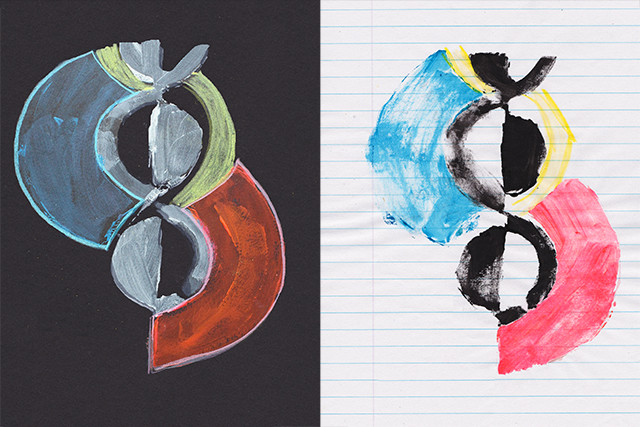Céline Manz
04 Aug - 04 Sep 2016
CÉLINE MANZ
Rythme Sans Fin, N° 1 – 1832
4 August — 4 September 2016
Céline Manz (1981) focuses her work on the complex area of copyright and the right to freedom of expression and quoting. She is copying and editing found images from magazines, the internet and art history, and explores the limits of copyright. When is a reproduction, or a copy of a reproduction, no longer subject to copyright law? Who is the owner of the images that have already been reproduced everywhere?
The installation in de Appel derives from a stencil in an edition of 300 that avant-garde artist Sonia Delaunay made in 1956, she reproduced a work of her deceased husband the artist Robert Delaunay. Like her predecessors in their early work, Manz makes drawings in various media - on print paper, packaging, sticky notes, envelopes, or on the back of a calendar from the kitchen.
All 1832 copies have the basic characteristics of the 'original', in terms of colours, shapes and signatures. They are therefore in principle all copyright violations. But they are unique and handmade by Manz, her signature on the back. The often diffuse copyright law states that if a copy transforms the original it can not be an offense. Manz pushes and pulls the boundaries of copyright and joins an art history full of "delinquents”.
Rythme Sans Fin, N° 1 – 1832
4 August — 4 September 2016
Céline Manz (1981) focuses her work on the complex area of copyright and the right to freedom of expression and quoting. She is copying and editing found images from magazines, the internet and art history, and explores the limits of copyright. When is a reproduction, or a copy of a reproduction, no longer subject to copyright law? Who is the owner of the images that have already been reproduced everywhere?
The installation in de Appel derives from a stencil in an edition of 300 that avant-garde artist Sonia Delaunay made in 1956, she reproduced a work of her deceased husband the artist Robert Delaunay. Like her predecessors in their early work, Manz makes drawings in various media - on print paper, packaging, sticky notes, envelopes, or on the back of a calendar from the kitchen.
All 1832 copies have the basic characteristics of the 'original', in terms of colours, shapes and signatures. They are therefore in principle all copyright violations. But they are unique and handmade by Manz, her signature on the back. The often diffuse copyright law states that if a copy transforms the original it can not be an offense. Manz pushes and pulls the boundaries of copyright and joins an art history full of "delinquents”.

